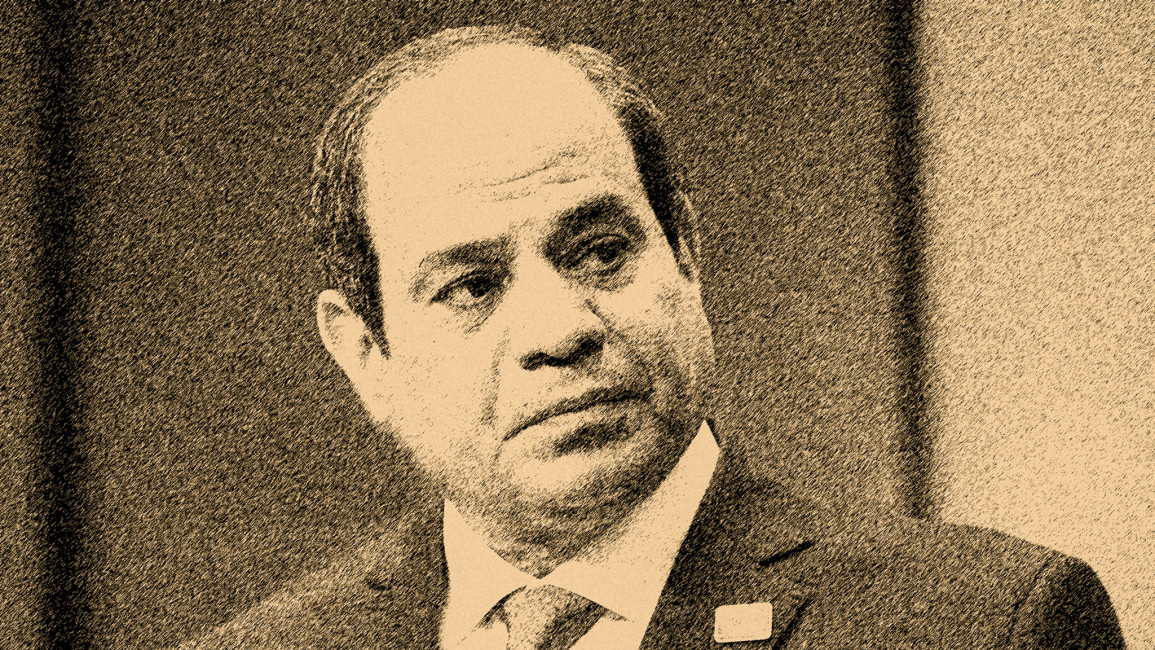The New Arab
09 Jun, 2023
09 Jun, 2023
Since Sisi has been in power, Egypt’s growing human rights abuses have been justified as fighting terrorism. Allowing him to co-chair the Global Counterterrorism Forum with the EU will only give him continued free reign, argues Abdelkader Cheref.

Several NGOs, including Human Rights Watch and Amnesty International, have denounced the EU’s decision to partner with Egypt in chairing the Global Counterterrorism Forum, writes Abdelkader Cheref.
Early last month, Egypt formally took over as a co-chair with the European Union, the Global Counterterrorism Forum (GCTF), a 30-member country international organisation that works closely with the United Nations to shape global counter-terrorism policies.
The EU-Egypt bid to co-chair the GCTF was proposed by France. However, several NGOs, including Human Rights Watch and Amnesty International, have denounced the EU’s decision to partner with Egypt. They claim the country’s human rights record, under the repressive rule of President Abdul Fattah al-Sisi, is stark.
Since Sisi led the toppling of Mohamed Morsi, the first democratically elected President of Egypt, he systematically jailed, tortured, and physically liquidated human rights activists and political opponents while unjustifiably labelling their legitimate activities as “terrorism”.
''Sisi and his regime have used counter-terrorism policies to muzzle any form of dissent; and he will definitely use his instrumental position within the Global Counterterrorism Forum (GCTF) to further abuse human rights in Egypt.''
Sisi’s 2013 coup as defence minister at the time, and member of the hegemonic Supreme Council of the Armed Forces (SCAF), was subsequent to days of mass anti-government demonstrations and Morsi's refusal to concede to an ultimatum from the generals. He was railroaded into ending what the generals termed Egypt’s most excruciating political crisis since Hosni Mubarak was ousted in 2011.
The rebellion against Morsi was executed by the rank and file in the streets but stage-managed and choreographed by media moguls, celebrities, and state dignitaries with significant ties to the Egyptian military. It was also, to a certain extent, backed by Israel, Saudi Arabia, the UAE, and the US.
It is worth mentioning that all this was done with the blessing of the Obama administration, but in total infringement of a US by-law. The US government provides $1.5 billion a year to Egypt in military and economic assistance but under US legislation, the government should hold off that foreign aid to any nation whose elected leader is overthrown in a coup d’état. Such a provision in the law was never acted upon.
Similarly, when on the campaign trail, Joe Biden pledged “no more blank cheques” to Sisi’s government. But once in the White House, this was disregarded in the name of realpolitik.
At the same time as the Obama administration continued to fund the Egyptian military, the army arrested Morsi along with a group of senior figures from the Muslim Brotherhood, and accused him of mishandling the economy as well as failing to address the very issues that triggered the Arab Spring and, ultimately, brought him to power.
Tens of thousands took to the streets of Cairo and Alexandria, demanding Morsi's immediate release and reinstatement. However, almost 1,000 people were massacred in Cairo’s Rabi’a al-Adawiya Square in August of 2013. A carnage the military authorities justified as a fight against “terrorism.”
As soon as Sisi became president the following year, he suspended the Egyptian constitution of 2012, banned the Muslim Brotherhood’s Freedom and Justice Party (FJP), jailed thousands of activists regardless of their political affiliation, and military officers invaded all spheres of power.
As a result, Egypt witnessed a wave of unprecedented violence by insurgents, which was used to tighten repression further. The Muslim Brotherhood was outlawed as a terrorist group. A case in point is the 2015 anti-terrorism law which grants security services unlimited powers to “ensure public order and security” comparable to the state of emergency laws effective during Mubarak’s regime.
And when Mubarak was released from jail, many Egyptians realised that they were back to square one, and that the deep state was in total control. It is also worth noting that Sisi had been Mubarak’s chief of military intelligence for years.
Like most of the other Arabic-speaking countries that witnessed popular protests in 2011, Egypt has since gone through a brutal counter-revolution. For many analysts, the success of the counter-revolution and the rise of Sisi is a clear indication of the power of the Egyptian “deep state”. Egypt’s top military brass – known as the Supreme Council of the Armed Forces (SCAF) – in alliance with the oligarchy and the judiciary, decided to first undermine Morsi, and maintain the status quo by hook or by crook.
And ever since Sisi came to power in 2013, the Egyptian government has engaged in a widespread crackdown on opposition activists, torture, enforced disappearances, and extrajudicial killings. Not to mention, according to the Committee to Protect Journalists, Egypt is also ranked among the world’s worst jailers of journalists. The president's latest call for dialogue with the media is but a fig leaf.
The current Sisi government is largely composed of rapacious military officers and pro-military bureaucrats who, as in other dictatorial regimes in the MENA, reject any idea of power-sharing with civilians. While the country’s rapidly growing population of almost 102 million is trying to cope with severe challenges, including pervasive youth joblessness among both the educated and the uneducated, a deep-rooted poverty, an impending water shortage, and a looming conflict with Sudan and Ethiopia caused respectively by the internal strife in Sudan and Ethiopia’s construction of the Grand Renaissance Dam.
While Sisi’s government is trivially engaged in an international PR stunt surrounding the very journalists it is repressing, it is also facing a catch-22 in Sudan. Exacerbating the current conflict in Sudan, Egypt is backing Sudanese army chief General Al-Burhan, while the UAE – Egypt’s principal financier – is backing the opposing faction led by the Rapid Support Forces (RSF).
In reality, Sisi and his regime have used counter-terrorism policies to muzzle any form of dissent; and he will definitely use his instrumental position within the Global Counterterrorism Forum (GCTF) to further abuse human rights in Egypt. The EU should instead take meaningful and persuasive measures to address the miserable human rights record in Sisi’s Egypt.
It is crystal clear that the EU, with the pivotal role of French president Emmanuel Macron, has decided to deliberately overlook the human rights abuses in Egypt. And its major concern is to embolden Sisi’s “counter-terrorism laws,” while whitewashing his crack down on independent civil society, and allow him to improve his sullied image on the global stage.

Dr. Abdelkader Cheref is an Algerian academic and a freelance journalist based in the US. As a former Fulbright scholar, he holds a PhD from the University of Exeter, Institute of Arab and Islamic Studies. His research interests are primarily politics in the MENA region, democratisation, Islam/Islamism, and political violence with a special focus on the Maghreb.
Follow him on Twitter: @Abdel_Cheref
Opinions expressed in this article remain those of the author and do not necessarily represent those of The New Arab, its editorial board or staff.
No comments:
Post a Comment